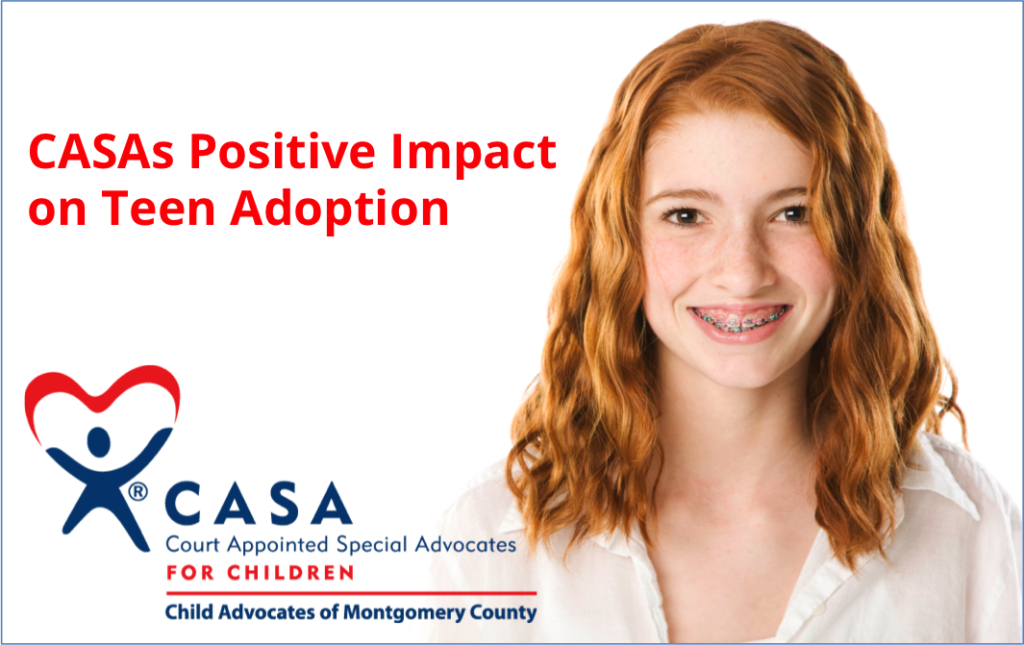CASAs Positive Impact on Teen Adoption

In any given state, there are hundreds of young people at risk of leaving foster care without permanent connections to a stable family and community. Nationwide, 23,000 teenagers face this dilemma each year. Children aged 10 and above make up approximately 50% of the children waiting for adoption.
Is adoption preferable to permanent connections with, let’s say, foster parents, teachers, coaches or other mentors? Adoption conveys certain legal rights, for example, inheritance, as well as a deeper sense of belonging. Of being a member of a family. When one woman asked her adopted son this question, his answer was, “With foster care, there was love in the room, but with adoption there’s love right up in your face.”
Often when a teen says he doesn’t want to be adopted, there are underlying reasons. CASA Volunteers can be wonderful in this role, accepting the challenge to go beneath the surface and find out what that youth means by “I don’t want to be adopted”. Does it mean he’s afraid of adoption? Or doesn’t want to betray his birth family? Or doesn’t want to be with strangers…yet another move, perhaps?
While adoption is not a magic “fix-all” solution—these children may have deeply rooted fears and emotional damage related to the trauma they have experienced—it’s better than the alternative of emancipating out of the system with no one to care for them and guide them. Statistics show that teenagers with someone who cares and protects him or her fare much better in life in general.
Take, for instance, the case of a girl adopted four days before her 18th birthday. She still runs away, still makes bad choices, but her parents stand by her. She has a number to call, and she always calls. She’s not pregnant or addicted to drugs. Had she not been adopted, the outcome in her life might have been quite different and much, much worse.
Sometimes, it’s difficult to get a family to come forward for these older children, to accept the unconditional commitment that “This is our kid, and we are his family”. If he has anger issues or mental health issues, the family must stay engaged. Most of the people who adopt older children do so because they feel someone needs to do something about this sad, and even costly to the community, situation.
There are some preconceived ideas about adopting a teenager that need to be confronted. Many who would adopt do not fear the teen but their own background and perhaps their behavior as a teenager. Others worry that they can’t get an older child to like them. Some potential adoptive parents aren’t technologically savvy, and kids today are. They’re concerned about what the child is doing on the internet and the possibility they might be harmed or tracked down. Another fear is that an older, adult-sized individual might be a threat to younger children in the home.
Adoptive parents must understand that the manila file is not the child. The file doesn’t capture that boy or girl’s personality. His or her hopes and dreams. You must endeavor to translate any bad behavior into what the young person is trying to convey. This understanding is the cornerstone of a CASA Advocate’s relationship with a teen. Teenagers with a CASA Volunteer also, fare much better than those who do not.
After adoption, the teenager’s needs and problems do not go away. Adoption is a commitment to provide a loving and safe home. At the very beginning, each CASA Volunteer makes that commitment to care and fight for the child’s best interests.
If you’re thinking of adopting, please consider the older children in the system or a teenager who needs a family and guidance.
A CASA Advocate does everything possible to help the child overcome his or her past and not only survive emancipation but thrive in life. The initial line in the Guidelines for Out-of-Home Placement from National CASA is: “FIRST, focus on the child. If your information about his/her needs is inadequate, gathering the rest is futile…”
Focus on the child defines the work of CASA. Won’t you join us?
